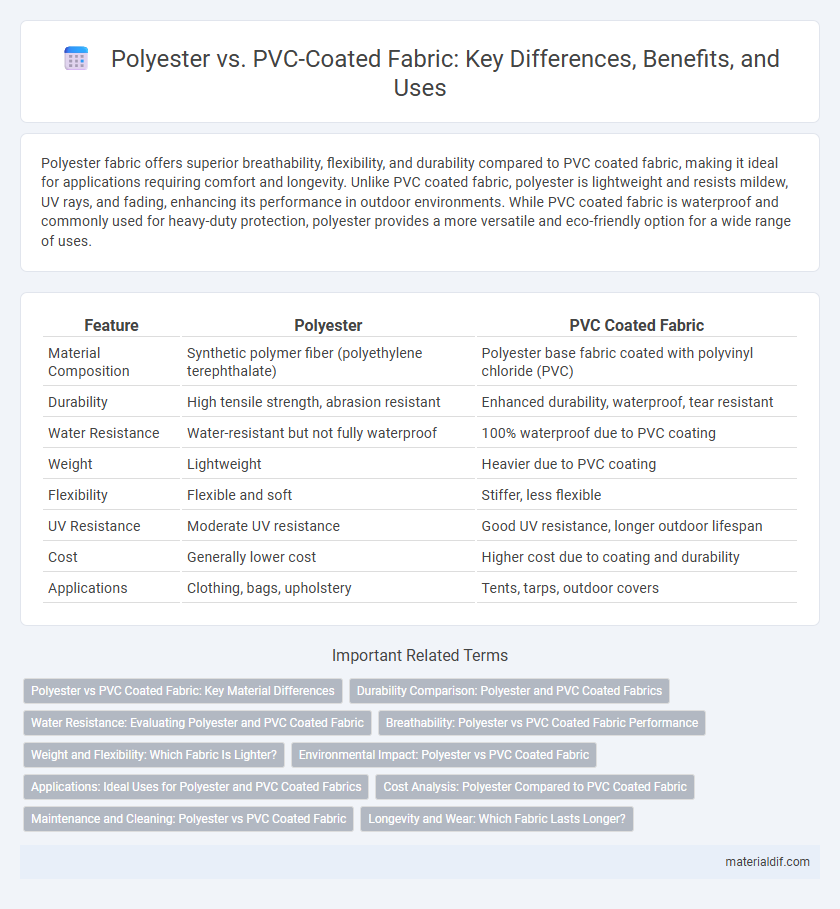Polyester fabric offers superior breathability, flexibility, and durability compared to PVC coated fabric, making it ideal for applications requiring comfort and longevity. Unlike PVC coated fabric, polyester is lightweight and resists mildew, UV rays, and fading, enhancing its performance in outdoor environments. While PVC coated fabric is waterproof and commonly used for heavy-duty protection, polyester provides a more versatile and eco-friendly option for a wide range of uses.
Table of Comparison
| Feature | Polyester | PVC Coated Fabric |
|---|---|---|
| Material Composition | Synthetic polymer fiber (polyethylene terephthalate) | Polyester base fabric coated with polyvinyl chloride (PVC) |
| Durability | High tensile strength, abrasion resistant | Enhanced durability, waterproof, tear resistant |
| Water Resistance | Water-resistant but not fully waterproof | 100% waterproof due to PVC coating |
| Weight | Lightweight | Heavier due to PVC coating |
| Flexibility | Flexible and soft | Stiffer, less flexible |
| UV Resistance | Moderate UV resistance | Good UV resistance, longer outdoor lifespan |
| Cost | Generally lower cost | Higher cost due to coating and durability |
| Applications | Clothing, bags, upholstery | Tents, tarps, outdoor covers |
Polyester vs PVC Coated Fabric: Key Material Differences
Polyester fabric offers high tensile strength, durability, and resistance to UV rays, making it ideal for outdoor applications. In contrast, PVC coated fabric combines polyester's base strength with a waterproof, flexible PVC layer that enhances chemical resistance and weatherproofing. Unlike polyester alone, PVC coated fabrics provide superior waterproof performance but may have reduced breathability and increased weight.
Durability Comparison: Polyester and PVC Coated Fabrics
Polyester fabrics exhibit excellent durability with strong resistance to stretching, shrinking, and abrasion, making them ideal for heavy-duty applications. PVC coated fabrics enhance durability by providing superior water resistance, UV protection, and chemical resistance, extending the fabric's lifespan in harsh environments. When comparing the two, PVC coated fabrics generally surpass polyester in terms of weather resistance and longevity, although polyester offers greater flexibility and breathability.
Water Resistance: Evaluating Polyester and PVC Coated Fabric
Polyester fabric offers moderate water resistance due to its hydrophobic fibers, making it suitable for light rain and moisture exposure. PVC coated fabric provides superior water resistance with its impermeable plastic coating, effectively blocking water penetration in heavy rain or wet conditions. When selecting materials, PVC coated fabric is ideal for applications requiring maximum waterproofing, while polyester is preferable for breathability and lighter water resistance.
Breathability: Polyester vs PVC Coated Fabric Performance
Polyester fabric offers superior breathability compared to PVC coated fabric, allowing better air circulation and moisture vapor transmission, which reduces heat buildup and enhances comfort in apparel and outdoor applications. PVC coated fabric, while highly durable and waterproof, tends to trap heat and moisture due to its non-porous coating, resulting in limited breathability and a risk of discomfort during extended wear or exposure. The balance between breathability and water-resistance makes polyester the preferred choice for activewear and breathable outdoor gear, whereas PVC coated fabric excels in protective coverings and environments requiring waterproof barriers.
Weight and Flexibility: Which Fabric Is Lighter?
Polyester fabric is generally lighter than PVC coated fabric, making it a preferred choice for applications requiring portability and ease of handling. The inherent flexibility of polyester allows it to bend and fold without cracking, whereas PVC coated fabric tends to be stiffer due to the thick polymer coating. This weight-to-flexibility ratio makes polyester ideal for lightweight, flexible uses such as sportswear and lightweight tents.
Environmental Impact: Polyester vs PVC Coated Fabric
Polyester exhibits a lower environmental impact compared to PVC coated fabric due to its higher recyclability and lower release of toxic chemicals during production. PVC coated fabrics involve chlorine-based components that pose significant challenges for sustainable disposal and can release harmful dioxins when incinerated. Life cycle assessments highlight polyester's advantage in carbon footprint reduction and reduced soil and water contamination over PVC alternatives.
Applications: Ideal Uses for Polyester and PVC Coated Fabrics
Polyester fabrics are widely used in apparel, home textiles, and industrial applications due to their durability, wrinkle resistance, and moisture-wicking properties. PVC coated fabrics are preferred for outdoor gear, tarpaulins, and protective covers because of their superior waterproofing and abrasion resistance. Both materials serve distinct purposes, with polyester excelling in comfort and flexibility, while PVC coatings provide enhanced protection and longevity in harsh environments.
Cost Analysis: Polyester Compared to PVC Coated Fabric
Polyester fabric generally offers a more cost-effective solution compared to PVC coated fabric, with lower raw material and manufacturing expenses contributing to its affordability. Polyester's durability and resistance to environmental factors reduce long-term maintenance costs, whereas PVC coated fabric may require higher initial investment due to its complex coating process and heavier weight. In large-scale applications, polyester's balance of performance and price often results in better overall cost efficiency than PVC coated alternatives.
Maintenance and Cleaning: Polyester vs PVC Coated Fabric
Polyester fabric offers superior ease of maintenance compared to PVC coated fabric, as it resists stains and dries quickly, requiring only mild detergent and water for cleaning. PVC coated fabric often demands more intensive cleaning methods due to its tendency to accumulate dirt and potential for surface damage from harsh chemicals. Regular gentle wiping preserves the durability of PVC coatings, while polyester's inherent resistance to mildew and fading ensures long-term cleanliness with minimal effort.
Longevity and Wear: Which Fabric Lasts Longer?
Polyester typically outlasts PVC coated fabric due to its higher resistance to UV rays, abrasion, and mildew, which enhances its longevity in outdoor applications. PVC coated fabric, while waterproof and durable, tends to degrade faster under prolonged exposure to sunlight and extreme temperatures, resulting in cracking and peeling over time. For long-term wear and durability, polyester remains the preferred choice in demanding environments.
Polyester vs PVC Coated Fabric Infographic

 materialdif.com
materialdif.com